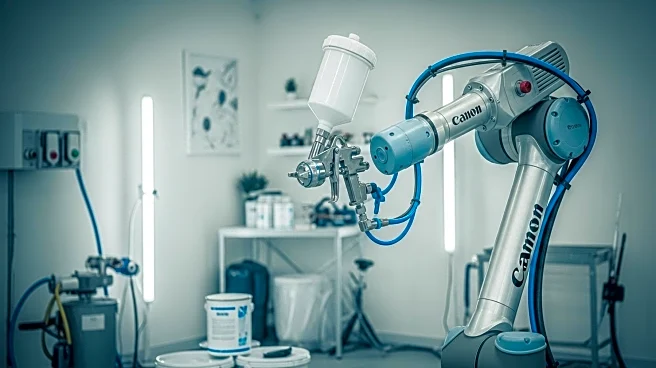What's Happening?
Lucid Bots, a company backed by Y Combinator, has launched new painting and coating capabilities for its Sherpa Drone, originally designed for cleaning building exteriors. The Charlotte, N.C.-based company, founded in 2018, specializes in AI robotics for demanding tasks and has raised $9 million in Series A funding. The Sherpa Drone can now paint exterior features by flying along automated paths, enhancing efficiency and safety in large-scale projects. Lucid Bots has surpassed 500 robot deployments, marking a significant milestone in its growth. The company claims its technology completes tasks up to three times faster and at half the cost compared to traditional methods.
Why It's Important?
The introduction of painting capabilities by Lucid Bots represents a significant advancement in the use of AI robotics in commercial applications. This development is particularly relevant as the U.S. undergoes a major infrastructure buildout, increasing demand for construction workers amidst a labor shortage. The technology not only improves efficiency but also enhances safety by reducing the need for human workers to perform dangerous tasks at heights. Lucid Bots' approach could redefine industry standards, offering a solution to the workforce challenges faced by the construction sector.
What's Next?
Lucid Bots plans to continue expanding its capabilities and increase the autonomy of its drones. The company aims for a single operator to deploy multiple drones simultaneously, further enhancing efficiency. As demand for infrastructure projects grows, Lucid Bots is positioned to play a crucial role in meeting these needs with its innovative technology. The company is likely to explore additional applications for its AI robotics, potentially entering new market verticals.
Beyond the Headlines
The use of embodied AI in robotics, as demonstrated by Lucid Bots, highlights a shift towards automation that not only observes but actively performs tasks. This technological leap could lead to broader adoption of AI in various industries, transforming how essential work is conducted. Ethical considerations regarding job displacement and the integration of AI into traditional labor markets may arise as these technologies become more prevalent.










